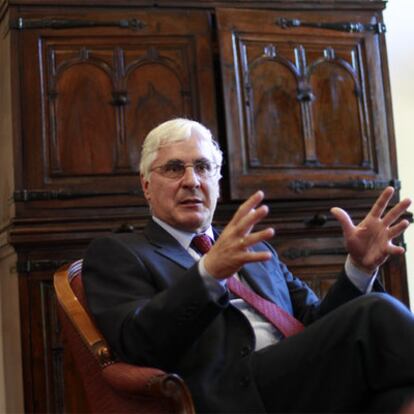The incumbent: "I devote 24 hours a day to the region; anything less is insulting"
He knows that the PP's guns are pointing at him, because the conservative party has made winning in Castilla-La Mancha a priority. José María Barreda, the Socialist incumbent, says that he will accept "all responsibility" no matter what happens on May 22. José Luis Rodríguez Zapatero, he notes, is not running.
Question. Are you aware that the responsibility of the PSOE's complete victory or defeat in these elections lies on your shoulders, since Castilla-La Mancha has become a symbol for both parties?
Answer. I am aware of the real and symbolic importance of results in Castilla-La Mancha because of the importance of the region itself and because it is a Socialist bastion where we have always been in power. The PP thinks this is their best bet because their candidate, María Dolores de Cospedal, is a national leader, the party's number two. What I'm worried about is the consequence of electoral results for the region. What's going to happen to health policies after May 22, what's going to happen with education, with computers for schools, with language learning...
"We have left behind the pessimism of feeling doomed to underdevelopment"
"The left as a whole has lost its bearings; we need to rearm ideologically"
Q. Who stands to lose more from electoral defeat: Cospedal or yourself?
A. Our career paths are very different. I have no ambitions outside Castilla-La Mancha; I don't seek a political career beyond my region. She started out here as a commissioner for the Madrid government and without moving a muscle she says she wants to combine her job as secretary general of the PP with the premiership of Castilla-La Mancha. For the last four years that is exactly what she has done: devote part of her time to the region, and that's insulting because it looks like Castilla-La Mancha is a second-rate region. A situation like that would be unthinkable in other parts of Spain. She says she devotes two or three days of her time to Castilla-La Mancha. I devote 24 hours to it, and that's still not enough.
Q. You often talk about the electoral sociology of Castilla-La Mancha: the PP wins general and European elections, as well as in the big cities, and runs into a wall in regional polls. Does that opinion make you an unorthodox figure who is on the fringes of the PSOE?
A. The main thing is for citizens to see that we are concerned about their problems and focused on them. We are the party of Castilla-La Mancha and citizens have noticed that this self-sufficiency has been good for their everyday lives, for infrastructure, for highways, for the AVE [high-sped train]. We have indeed made demands to improve life in the region and left behind that pessimism that said that Castilla-La Mancha was doomed to permanent underdevelopment.
Q. Will your campaign challenge the central government?
A. The campaign needs to pose challenges, but not with regard to the central government but to the values and principles that we represent. My proposal is social-democratic in nature; I want to work to ensure that citizens enjoy security from the cradle to the grave, with basic services guaranteed and a maximum degree of dignity for human beings.
Q. Does that mean that the PSOE left those policies by the wayside because of the crisis?
A. It is not something that affects one party or one country but the left as a whole, a left that has lost its bearings. Yes, the crisis has underscored its shortcomings: there is a need for an ideological rearmament. As our slogan says, it is not the same whether the left or the right is in power.
Q. Is ideology behind your refusal to install the proposed nuclear waste storage site in Yebra, Guadalajara province?
A. We don't want it. Castilla-La Mancha's nuclear contribution is enough as it is, and we are committed to renewable energy. We don't want to be remembered for that site, and we wanted to make that clear with a vote in the regional assembly, but when the time came the PP also voted against it.
Q. The PSOE has a chance to enter into all these debates, even in the ideological one you propose, in the upcoming Socialist primaries to elect the candidate to run for prime minister.
A. That's after the elections, after May 23. Now it's time to focus on the elections.
Q. Do you agree with both candidates that seem certain, Alfredo Pérez Rubalcaba and Carme Chacón?
A. Those specific definitions are for after May 23. Now, it's time for municipal and regional elections.

Tu suscripción se está usando en otro dispositivo
¿Quieres añadir otro usuario a tu suscripción?
Si continúas leyendo en este dispositivo, no se podrá leer en el otro.
FlechaTu suscripción se está usando en otro dispositivo y solo puedes acceder a EL PAÍS desde un dispositivo a la vez.
Si quieres compartir tu cuenta, cambia tu suscripción a la modalidad Premium, así podrás añadir otro usuario. Cada uno accederá con su propia cuenta de email, lo que os permitirá personalizar vuestra experiencia en EL PAÍS.
¿Tienes una suscripción de empresa? Accede aquí para contratar más cuentas.
En el caso de no saber quién está usando tu cuenta, te recomendamos cambiar tu contraseña aquí.
Si decides continuar compartiendo tu cuenta, este mensaje se mostrará en tu dispositivo y en el de la otra persona que está usando tu cuenta de forma indefinida, afectando a tu experiencia de lectura. Puedes consultar aquí los términos y condiciones de la suscripción digital.








































